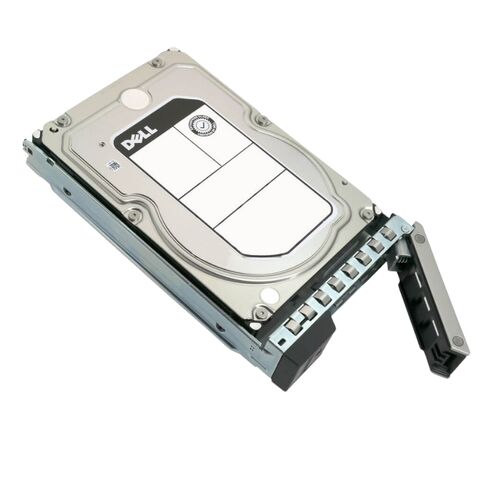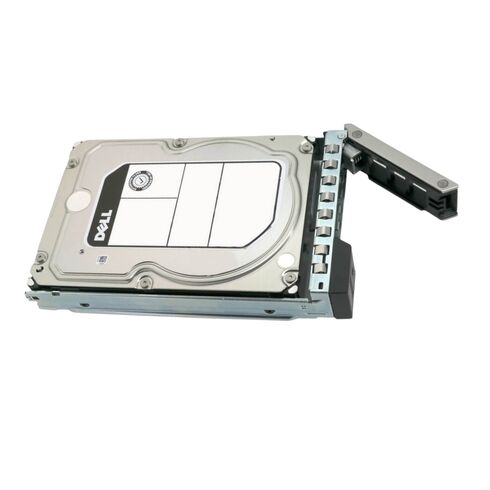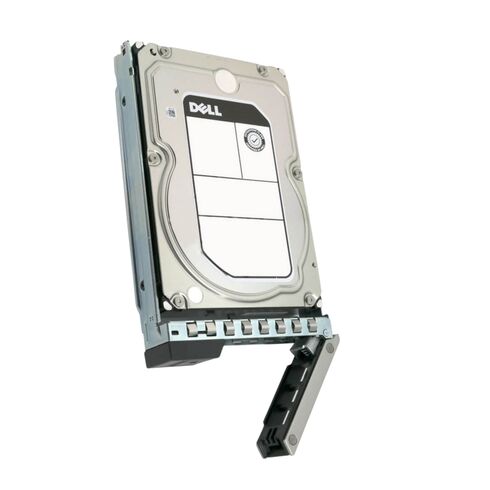8JYD7 Dell 12TB SATA-6GBPS 7.2K RPM 512e Hot Plug Hard Drive
- — Free Ground Shipping
- — Min. 6-month Replacement Warranty
- — Genuine/Authentic Products
- — Easy Return and Exchange
- — Different Payment Methods
- — Best Price
- — We Guarantee Price Matching
- — Tax-Exempt Facilities
- — 24/7 Live Chat, Phone Support
- — Visa, MasterCard, Discover, and Amex
- — JCB, Diners Club, UnionPay
- — PayPal, ACH/Bank Transfer (11% Off)
- — Apple Pay, Amazon Pay, Google Pay
- — Buy Now, Pay Later - Affirm, Afterpay
- — GOV/EDU/Institutions PO's Accepted
- — Invoices
- — Deliver Anywhere
- — Express Delivery in the USA and Worldwide
- — Ship to -APO -FPO
- — For USA - Free Ground Shipping
- — Worldwide - from $30
Product Overview of the Dell 12TB Hard Drive
- Storage solution designed for Dell's 14th Generation PowerEdge servers.
- Combines large 12TB storage capacity with fast data transfer rates.
- Ideal for data-intensive applications requiring high-performance storage.
General Information
- Manufacturer: Dell
- Part Number: 8JYD7
- Type: Hard disk drive with integrated tray
Technical Specifications
Storage Capacity & Format
- High-capacity 12TB storage enables efficient handling of large data sets.
- Standard 3.5-inch form factor, ensuring compatibility with standard server bays.
- Utilizes 512e Advanced Format technology for optimized data handling and reliability.
Interface & Transfer Rate
- Features SATA 6Gbps interface, facilitating fast data access and transfers.
- Supports external data transfer speeds up to 600 MB/s for improved performance.
Performance Highlights
Rotational Speed
- 7200 RPM rotational speed balances performance and reliability.
- Efficient for data centers requiring robust and dependable data retrieval.
Expansion & Connectivity
- Interfaces: SATA 6Gbps port supports quick data transfer capabilities.
- Compatibility: Hot-swappable 3.5-inch bay slot for easy installation and upgrades.
Server Compatibility
- Supports a range of Dell PowerEdge servers, enhancing flexibility:
- PowerEdge C6420
- PowerEdge R440, R540, R640, R740, R740xd
- PowerEdge R6415, R7415, R7425
- Designed to seamlessly integrate with Dell's PowerEdge 14G series.
Capacity: 12TB
The Dell 8JYD7 Hard Drive boasts an impressive capacity of 12TB, making it an excellent choice for users who require ample storage space for their data-intensive applications and large files. With such a high capacity, users can store vast amounts of data, including documents, photos, videos, and more, without worrying about running out of space.
Benefits of 12TB Capacity
1. Ample Storage: The 12TB capacity ensures that users have plenty of space to store their files without the need for frequent backups or external storage devices. It is ideal for individuals and businesses dealing with large data volumes.
2. Enhanced Productivity: With a larger capacity, users can keep all their files in one place, eliminating the need to search through multiple drives or cloud storage platforms. This convenience translates into improved productivity as users can quickly access and work with their data.
3. Future-Proofing: As technology advances and file sizes continue to grow, having a generous storage capacity ensures that users are prepared for future requirements. The 12TB capacity offers room for expansion and ensures compatibility with evolving data storage needs.
Importance of 12TB Capacity
The importance of a 12TB capacity cannot be overstated, especially in scenarios where data is critical for business operations or personal use. Here are a few reasons why this feature is crucial:
Data-Intensive Applications:
For professionals working with resource-intensive applications like video editing software or database management systems, a 12TB capacity provides the necessary space to store and manipulate large files without compromising performance.
Media Storage:
In the era of high-definition videos and massive image files, users who frequently work with multimedia content benefit greatly from a 12TB capacity. It allows them to store their media library in one place, eliminating the need for external drives or cloud storage subscriptions.
Backup and Archiving:
Backing up important files and archiving data is essential for both individuals and businesses. The 12TB capacity allows users to create comprehensive backups of their systems, ensuring that their data remains safe and recoverable in case of any unforeseen events.
Speed: 7.2K RPM
The Dell 8JYD7 Hard Drive features a rotational speed of 7.2K RPM (Rotations Per Minute). This high-speed capability significantly enhances the drive's performance, making it an excellent choice for users who require fast and responsive data access.
Benefits of 7.2K RPM Speed
1. Improved Data Transfer: The 7.2K RPM speed enables faster data transfer rates, allowing users to quickly read and write data to the hard drive. This is particularly beneficial for tasks that involve frequent access to large files or databases.
2. Reduced Latency: With a higher rotational speed, the drive can locate and retrieve data more rapidly, resulting in reduced latency. This means users can access their files and applications faster, leading to improved overall system responsiveness.
3. Seamless Multitasking: The increased speed ensures smooth multitasking capabilities, enabling users to run multiple applications simultaneously without experiencing performance bottlenecks. This is particularly advantageous for power users who rely on resource-intensive software.
Importance of 7.2K RPM Speed
The importance of the 7.2K RPM speed cannot be understated when it comes to optimizing performance and user experience. Here are a few reasons why this feature is significant:
Business Applications:
For businesses, where time is of the essence, the 7.2K RPM speed plays a crucial role in ensuring that critical applications and databases perform efficiently. It enables faster data retrieval, resulting in improved productivity and reduced downtime.
Gaming and Multimedia:
Gamers and multimedia enthusiasts benefit from the high-speed performance of the 7.2K RPM drive. It allows for quick loading times, seamless gameplay, and smooth multimedia playback, enhancing the overall gaming and entertainment experience.
Virtualization and Server Environments:
In virtualized environments or servers, where multiple virtual machines or users access shared resources simultaneously, the 7.2K RPM speed helps in maintaining optimal performance levels. It ensures that data access requests are promptly fulfilled, preventing any lag or delays.
Interface: SATA-6GBPS
The Dell 8JYD7 Hard Drive utilizes the SATA-6GBPS interface, which offers high-speed data transfer capabilities and excellent compatibility with a wide range of devices. This feature makes it an ideal choice for users who require fast and reliable connectivity.
Benefits of SATA-6GBPS Interface
1. Faster Data Transfer: The SATA-6GBPS interface provides significantly faster data transfer speeds compared to its predecessors. This allows users to move files quickly between the hard drive and other devices, such as computers or external storage solutions.
2. Compatibility: The SATA-6GBPS interface is widely supported across various devices, including desktop computers, laptops, servers, and external storage enclosures. This ensures that users can easily connect the hard drive to their existing systems without compatibility issues.
3. Ease of Installation: The SATA interface offers a straightforward and hassle-free installation process. It uses standard connectors and cables, making it user-friendly even for individuals with limited technical knowledge.
Importance of SATA-6GBPS Interface
The importance of the SATA-6GBPS interface lies in its ability to provide fast and reliable connectivity, as well as its compatibility with a wide range of devices. Here are a few reasons why this feature is essential:
Performance Optimization:
The SATA-6GBPS interface maximizes the performance of the hard drive by ensuring that data can be transferred quickly and efficiently. This is particularly beneficial when working with large files or running resource-intensive applications.
Future-Proofing:
As technology evolves, it is crucial to have a storage solution that can keep up with the latest advancements. The SATA-6GBPS interface offers a level of compatibility that ensures the hard drive can be used in future devices without any issues.
Flexibility:
The widespread support for the SATA-6GBPS interface means that users have the flexibility to connect the hard drive to various devices based on their specific requirements. It provides a versatile solution that can be easily integrated into different setups.
Buffer: 256MB
The Dell 8JYD7 Hard Drive features an impressive 256MB buffer, which acts as a temporary storage space for frequently accessed data. This feature enhances performance by allowing the drive to retrieve information more quickly, resulting in improved overall system responsiveness.
Benefits of 256MB Buffer
1. Enhanced Read and Write Speeds: The large buffer size of 256MB allows the hard drive to store frequently accessed data, reducing the time it takes to retrieve information. This results in faster read and write speeds, improving the overall performance of the drive.
2. Smooth Multitasking: The buffer helps in ensuring smooth multitasking capabilities, especially when working with multiple applications that require simultaneous access to data. It allows for faster retrieval of frequently used files, preventing any performance degradation.
3. Reduced Disk Fragmentation: With a larger buffer, the hard drive can hold more data in memory, reducing the need for frequent disk reads and writes. This helps in reducing disk fragmentation, which can have a negative impact on performance over time.
Importance of 256MB Buffer
The importance of the 256MB buffer lies in its ability to improve data access speeds and overall system performance. Here are a few reasons why this feature is significant:
Resource-Intensive Applications:
Users who work with resource-intensive applications, such as video editing software or virtual machines, benefit greatly from a large buffer size. It allows for faster access to frequently used files or data blocks, enhancing application responsiveness.
Operating System Performance:
The buffer plays a crucial role in improving the performance of the operating system by enabling faster retrieval of system files and frequently accessed data. This results in smoother system operations and reduced loading times.
Data-Intensive Workloads:
In scenarios where users deal with large datasets or perform data analysis tasks, the 256MB buffer helps in accelerating data processing. It allows for quicker access to frequently used portions of the dataset, improving overall efficiency and productivity.
Format: 512e
The Dell 8JYD7 Hard Drive utilizes the 512e format, which stands for 512-byte emulation. This format provides compatibility with older systems that require 512-byte sector sizes, while also offering the benefits of larger physical sector sizes.
Benefits of 512e Format
1. Compatibility: The 512e format ensures compatibility with systems that rely on the traditional 512-byte sector size. This makes the hard drive suitable for use in legacy systems or environments where older software or operating systems are still in use.
2. Larger Physical Sector Sizes: While maintaining compatibility with older systems, the 512e format also supports larger physical sector sizes, typically 4KB. This provides advantages such as improved performance, increased reliability, and better error correction capabilities.
3. Future-Proofing: The 512e format offers a balance between compatibility and modern storage technologies. It allows users to utilize their hard drive in both legacy and modern systems, ensuring that their investment is future-proofed and can adapt to changing requirements.
Importance of 512e Format
The importance of the 512e format lies in its ability to bridge the gap between legacy systems and modern storage technologies. Here are a few reasons why this feature is essential:
Legacy System Support:
In environments where older systems or software are still in use, having a hard drive that supports the traditional 512-byte sector size is crucial. The 512e format ensures that users can seamlessly integrate the drive into their existing setups without any compatibility issues.
Performance Optimization:
The larger physical sector sizes supported by the 512e format contribute to improved performance. It allows for more efficient data storage, reduces overhead, and enhances error correction capabilities, resulting in faster and more reliable data access.
Adaptability:
As technology continues to evolve, the 512e format ensures that the hard drive can adapt to future storage requirements. It provides users with the flexibility to upgrade their systems without worrying about compatibility issues, making it a future-proof solution.
HotPlug: 1
The Dell 8JYD7 Hard Drive features HotPlug capability, allowing users to insert or remove the drive from their systems without the need for a system restart. This feature offers convenience and flexibility, making it an attractive choice for users who require hot-swappable storage solutions.
Benefits of HotPlug
1. Convenience: The HotPlug feature eliminates the need for system restarts when inserting or removing the hard drive. This saves time and allows for seamless integration or removal of storage devices, enhancing user convenience.
2. Easy Maintenance and Upgrades: With HotPlug capability, users can easily perform maintenance tasks or upgrade their storage solutions without disrupting system operations. It simplifies the process of replacing faulty drives or expanding storage capacity, minimizing downtime.
3. Flexibility: The ability to hot-swap drives provides users with the flexibility to adapt their storage configurations based on their changing needs. It allows for easy data transfer between systems or enables the use of multiple drives for different purposes.
Importance of HotPlug
The importance of the HotPlug feature lies in its ability to provide convenience and flexibility in managing storage devices. Here are a few reasons why this feature is significant:
Data Center Environments:
In data center environments where uptime is critical, the HotPlug capability ensures that storage devices can be replaced or upgraded without causing service interruptions. It allows for seamless maintenance and minimizes the impact on overall system performance.
External Storage Solutions:
HotPlug is particularly useful for external storage solutions, such as RAID enclosures or network-attached storage (NAS) devices. It enables users to easily add or remove drives for backup or data sharing purposes, without needing to power down the entire system.
Efficient Troubleshooting:
In scenarios where troubleshooting is required, the HotPlug feature allows for quick and easy testing of different drives or configurations. Users can swap drives to isolate issues and identify faulty hardware without disrupting the workflow.
CompatibleWith: Server
The Dell 8JYD7 Hard Drive is specifically designed to be compatible with servers, making it an ideal choice for users who require reliable and high-performance storage solutions for their server environments.
Benefits of Server Compatibility
1. Reliable Performance: The hard drive's compatibility with servers ensures that it meets the rigorous performance demands of server environments. It is designed to handle constant data access, high workloads, and 24/7 operation, providing reliable performance and minimizing downtime.
2. Seamless Integration: The hard drive's compatibility with servers ensures seamless integration into existing server setups. It is designed to work seamlessly with server hardware and software configurations, reducing the complexity of installation and setup processes.
3. Scalability: Servers often require scalable storage solutions to accommodate growing data volumes and expanding business needs. The compatibility of the hard drive with servers allows for easy scalability, enabling users to add more drives or upgrade their storage capacity as required.
Importance of Server Compatibility
The importance of server compatibility lies in its ability to provide reliable performance, seamless integration, and scalability in server environments. Here are a few reasons why this feature is essential:
Data Redundancy and Fault Tolerance:
Server environments often implement data redundancy and fault tolerance mechanisms, such as RAID (Redundant Array of Independent Disks), for enhanced data protection. The hard drive's compatibility ensures that it can be easily integrated into such configurations, providing reliable and fault-tolerant storage solutions.
Server Virtualization:
In virtualized server environments, where multiple virtual machines run on a single physical server, the hard drive's compatibility ensures optimal performance and compatibility with virtualization technologies. It allows for efficient storage management and virtual machine deployment.
Enterprise-Class Storage:
For enterprise organizations that rely on servers for critical business operations, ensuring compatibility with their server infrastructure is paramount. The hard drive's compatibility provides peace of mind, knowing that it meets the stringent requirements of enterprise-class storage solutions.











